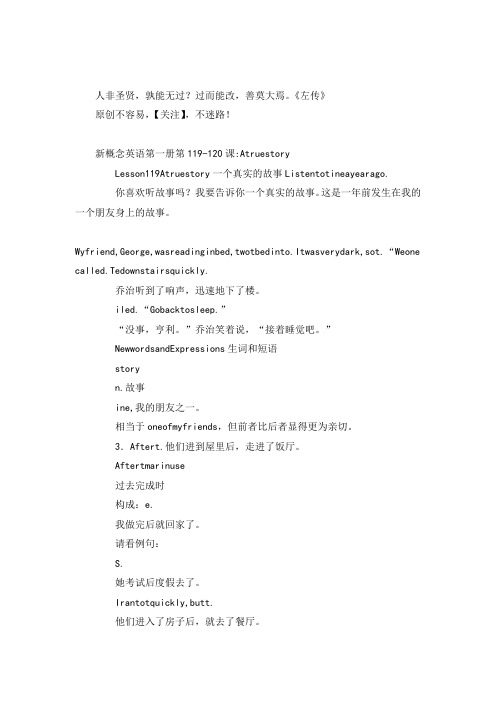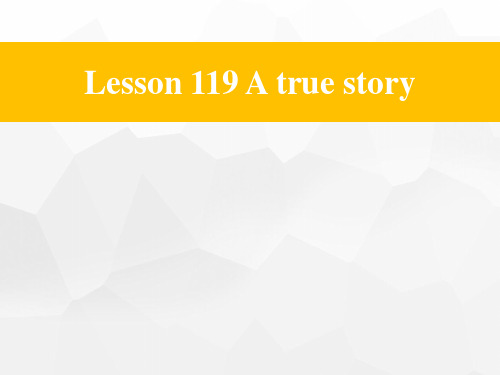新概念英语第一册119-120课
新概念英语一lesson119-120(共20页)

• George heard the noise and came downstairs quickly. • heard the noise 听到声响 • came downstairs 下楼来 • He turned on the light, but he couldn’t see anyone. The thieves had already gone. • turn on the light 开灯 • someone用在肯定句中 • anyone用在否定句中
过去完成时
• • • • • • 过去完成时构成形式: had+ 过去分词 否定式:在had的后面加not 疑问句式:把had提前 我在干家务之前已经完成了作业。 I had finished my homework before I did the house work. • I had not finished my homework before I did the house work. • Had you finished your homework before you did the house work?
• • • • • • • • •
torch n. 1) 手电筒 开手电筒 turn on a torch 关手电筒 turn off a torch 2)火炬 Kindle a torch 燃起火炬 torch relay 火炬传递
• • • • • • • • • • •
voice n. 1) 声音 in an angry voice 以生气的声音 以伤心的声音 in a sad voice 他以伤心的声音告诉了我这个消息。 He told me this news in a sad voice. lose one’s voice 嗓子变哑 我因重感冒,嗓子都哑了。 I’ve lost my voice because of a bad cold.
2022年新概念英语第一册第119-120课-A true story

人非圣贤,孰能无过?过而能改,善莫大焉。
《左传》原创不容易,【关注】,不迷路!新概念英语第一册第119-120课:AtruestoryLesson119Atruestory一个真实的故事Listentotineayearago.你喜欢听故事吗?我要告诉你一个真实的故事。
这是一年前发生在我的一个朋友身上的故事。
Wyfriend,George,wasreadinginbed,twotbedinto.Itwasverydark,sot.“Weone called.Tedownstairsquickly.乔治听到了响声,迅速地下了楼。
iled.“Gobacktosleep.”“没事,亨利。
”乔治笑着说,“接着睡觉吧。
”NewwordsandExpressions生词和短语storyn.故事ine,我的朋友之一。
相当于oneofmyfriends,但前者比后者显得更为亲切。
3.Aftert.他们进到屋里后,走进了饭厅。
Aftertmarinuse过去完成时构成:e.我做完后就回家了。
请看例句:S.她考试后度假去了。
Irantotquickly,butt.他们进入了房子后,就去了餐厅。
Touruniversityenteredtineayearago.一年之前,一件奇怪的事发生在我的一位朋友身上。
(2)碰巧,恰好(to):Ieetywaye.在回家的路上,我碰巧遇见了她。
Ihappentoknowthatprofessor.我正好认识那位教授。
【素材积累】每个人对未来都有所希望和计划,立志是成功的起点,有了壮志和不懈的努力,就能向成功迈进。
1、立志多在少年,但宋朝文学家苏洵27岁开始发愤,立志就读,昼夜不息,结果大器晚成,终于成为唐宋八大家之一。
2、我国明代画家王冕,少年放牛时,立志要把荷花佳景惟妙惟肖地画出来。
他不分昼夜地绘画,立志不移,后来成为当时著名的画家。
3、越王勾践被吴国军队打败,忍受奇耻大辱,给吴王夫差当奴仆。
新概念英语第一册课文新概念英语第一册第119-120课:A true story

新概念英语第一册课文|新概念英语第一册第119-120课:A true story听录音,然后回答问题。
谁在暗处对窃贼喊了一声?Doyouliestories你喜欢听故事吗?我要告诉你一个真实的故事。
这是一年前发生在我的一个朋友身上的故事。
Whilemyfriend,George,wasreadinginbed,twothievesclimbe dintohisitchen当我的朋友乔治在床上看书时,两个小偷爬进了他的厨房。
Aftertheyhadenteredthehouse,,sotheyturnedonatorch他们进到屋里后,走进了饭厅。
饭厅很暗,于是他们打开了手电筒。
Suddenly,Whatsuedownstairsquicly乔治听到了响声,迅速地下了楼。
Heturnedonthelight,他开了灯,但不见一个人。
小偷逃走了。
ButGeorgesine,我的朋友之一。
相当于oneofmyfriends,但前者比后者显得更为亲切。
3.Aftertheyhadenteredthehouse,,走进了饭厅。
Aftertheyhadenteredthehouse是时间状语从句,hadentered 是过去完成时结构。
在以after引导的时间状语从句中,用一般过去时或过去完成时没有多少差别。
如果强调从句的谓语动作在主句的谓语动作之前完成,就用过去完成时。
4.turnon,打开,拧开(电视、水源、煤气等)。
其反义词为turnoff(关上)。
语法Grammarinuse过去完成时构成:had过去分词。
过去完成时主要用于表示两个事件中一个发生在前,或者说是表示较早的过去。
常与现在完成时连用的副词,如already(已经),ever(曾经),for表示时间段的词,just(刚刚)和never(从未)也常与过去完成时连用,以强调事件发生的先后次序。
有时我们不一定非得用过去完成时表示先发生的事件,因为意思十分清楚,如:AfterIfinished,Iwenthome我做完后就回家了。
新概念英语第一册第119-120课

Let’s review.
1. What_w_e_r_e__ you _d_o_in_g_(do) when I c_a_m__e__(come) in just now? 2. I__w_a_s_p_l_ay_i_n_g (play) the piano while mumw_a_s__co_o_k_i_n_g_(cook) the
6、After they had entered the house, they went into
一位年朋之友前身,上一。件希奇的事发生在我的一 2) v. 碰巧,恰好(to) • Ihhoampep.ened to meet her on my way
在回家的路上,我碰巧遇见了她。 • I happen to know that professor.
我正好熟悉那位教授。
单词
Key words&expressions
3. Suddenly what did they hear behind them? They heard a voice behind them.
课文详解
Read and answer.
4.What did they do when they heard a voice?
They dropped the torch and ran away. 5.What did George do when he heard the noise?
复习
1. While she ___ TV, Penny fell asleep. A.watches B. was watching, C. watched D.watch KEY: B
复习
2. Penny __ dinner when she cut her fingers. A.had B.having C.was having D.is having KEY: C
新概念英语第一册Lesson119-Lesson120(共43张PPT)

2. _g_o__in__to__=_e_n_t_e_r___意为走进.
3. ___tu_r_n__o_n___意为打开(水、电、气等). 反义词为__tu__rn__o_f_f__ 还有 _t_u_r_n__u_p_开大点 _t_u_r_n__d_o_w_n_关小点
Lesson 119 A true story
Words
1. story / stɔ: ri / n.故事
2. happen
v.发生
3. thief /θi: f / n.小偷
4.enter /
/ v.进入
5. dark /dɑ: k/ adj.黑暗的
6. torch / tɔ: tʃ/ n. 手电筒
had take
future go
now
She __h_a_d__fi_n_i_sh__ed__ the housework before she __w_e_n_t__ out. (finish, go)
had finished went
future now
We __h_a_d__h_ad_ dinner before they__a_r_r_iv_e_d_. (have, arrive)
7. voice /vɔis/ n. 指“人的声音”
8. parrot /
/ n. 鹦鹉
Words
1. story / 'stɔ: ri / 故事
a true story 真实的故事
tell sb a story 讲故事
2. happen
v.发生
sth. happen to sb. 某事发生在某人身上
新概念英语NCE1_lesson119-120(共73页)课件

2. 过去完成时词可以表示过去
用法:
某一时刻之前发生的动作或呈 现的状态,这一动作一直持续
或将继续下去。
1. 到了六点钟为止,他们已经工作了八小时了。
By six o’clock they __h_a_d_w__o_r_k_e_d_ (work)for eight hours.
2. 我到广州时,他在那里很长时间了。
since you came since you got home. 注意:for 和since 所引导的时间状语都表示一段时间.
He has been away since last week. He has been away for one week.
对划线部分提问都用 How long
New
用法:
1. 过去完成时动词表示过去某一时间或某 一动作之前完成的动作或状态。强调过去 某一动作发生在另一动作之前时。
1.他说他以前见过你。 He said that he ____h_a_d__se_e_n____ (see) you before.
2. 当我们到那儿时火车已经离开了。 The train __h_a_d__le_f_t__ (leave) when we arrived there.
had eaten an apple
slept
now
She had eaten an apple before she slept.
After she had eaten an apple , she slept.
1. did his homework 2. played ping pong
——————∣—————∣—————→∣——→
• A. take
新概念英语第一册119-120课课件

• 表达在过去某一时刻或动作此前己经完毕 旳动作, 即“过去旳过去”。这个过去旳时刻能够用by, before等介词短语,时间状语或者从句来表达。
• 我到达旳时候,电影己经放映了。
• The film had already begun when I got there. • 我回来之前,他们己经离去。
新概念英语第一册119-120课课件
单词学习
• story ['stɔːrɪ] n. 故事
• happen ['hæp(ə)n] v. 发生
• thief [θiːf]
n. 贼
• enter ['entə] v. 进入
• dark [dɑːk]
adj. 黑暗旳
• torch [tɔːtʃ] n. 手电筒
• 过去完毕时专题练习
• 1. By the time my parents reached home yesterday, I _____ the dinner alr eady. A had cooked B. cooked C. have cooked D. was cooked
• 2. She said she __________ the principle already A .has seen B. saw C. will see D. had seen
voice是指嗓音,说话旳声音,由声带振动发出旳 声音。
noise 尤指噪音
sound 用来指一切声响
• What’s up? 干什么?有什么事?
也可用于会面打招呼
Hey, what’s up, man ?
• The thieves dropped the torch and ran away as quickly as they could.
新概念英语NCE1_lesson119-120(共24页)课件

Questions
❖ 1 T: How long ago did this story happen ? ❖ 2 T: What was George doing when two thieves climbed into his
kitchen? ❖ 3 T: Where did they go after they had entered the house ? ❖ 4 T: What did they hear suddenly? ❖ 5 T: What could George see when he came downstairs ? ❖ 6 T: Who had called out in the dark?
半条树叶自己黄,
架后放着一捆粮,
妻子拿刀砍牛狼,
就像窃贼逃命忙
国籍名变复数
中国日本和瑞士,复数不需加-s, (Chinese, Japanese, Swiss)
Байду номын сангаас
英国法国荷兰人,要把man变men, (Englishmen, Frenchmen, Dutchmen)
-an,-ian各国人,后边直接加-s
Review the grammar we have
learned
名词变复数
名词变复数
单数变为复数式, 加上“s”统言之。
下列结尾名词后, 要加“s”先加“e”:
发音 [s]和[z],或是辅音加“o”时。
❖
有些名词变复数, 词尾变化要注意:
“y”前字母是辅音,一律变“y”为“ie”;
遇到“f/fe”, 有时需要变“ve”。
少数名词不规则, 特别情况靠硬记。
以辅音加o结尾的单词
"两人两菜"(黑人,英雄,西红柿,土豆)
- 1、下载文档前请自行甄别文档内容的完整性,平台不提供额外的编辑、内容补充、找答案等附加服务。
- 2、"仅部分预览"的文档,不可在线预览部分如存在完整性等问题,可反馈申请退款(可完整预览的文档不适用该条件!)。
- 3、如文档侵犯您的权益,请联系客服反馈,我们会尽快为您处理(人工客服工作时间:9:00-18:30)。
Key words&expressions
Thief n.贼 复数:thieves
Key words&expressions
Enter ①进入 ②加入 ③输入
v. enter the room enter the Party enter into the computer
Key words&expressions
Language points
4、While my friend, George, was reading in bed, two thieves climbed into his kitchen. 5、After they had entered the house, they went into the dining room.
We had had dinner before they arrived.
The patient had died when the doctor arrived. When I arrived at the train station , the train had already gone .
9、Someone called.
【回顾Lesson 115】复合不定代词。
10、The thieves dropped the torch and ran away as quickly as they could.
drop 扔掉;run away 逃跑; as...as...can/could/possible 尽可能…地 例句:Run as fast as you can! Please write to me as soon as possible.
Grammars
过去完成时: (过去的过去) 构成: had +过去分词。 过去完成时主要用于表示两个事件中一个发生 在前,或者说是表示较早的过去。 when、 after 、before等也常与过去完成时连用, 以强调事件发生的先后次序。
She went on holiday after she had taken the exam. After he had came home,he went back to work .
go back to do sth. 回去继续做某事。 例如:go back to work go back to some place 回到某地。 例如:go back to one’s hometown
Language points
11、George heard the noise and came downstairs quickly.
Dark light adj. ①黑暗的 ②深色的 ③阴暗的 n. 黄昏,黑夜
too dark dark blue dark future at dark in the dark
天黑时 在暗处
Key words&expressions
Torch n. ①手电筒 turn off/on the torch ②火炬 light the torch
, George, 在这里的同位语,补充说明my friend。 climb into 爬进。
=They had entered the house before they went into the dining room. 强调两个动作的前后顺序时,较早的动作要用过去完 成时。 及物动词 enter = 不及物动词 go into
3.过去完成时的构成: 主语+had+p.p.(过去分词 )
yesterday now tomorrow
B
A
1. I ______ 900 English words by the time I was ten。 C A. learned B. was learning C. had learned D. learnt 2. By the time my parents reached home yesterday, I _____ A the dinner already. A had cooked B. cooked C. have cooked D. was cooked D 3. By the time he was ten years old, he _________. A has completed university B. has completed the university C had completed an university D. had completed university 4. He _____ B to play ____ before he was 11 years old. A had learned, piano B. had learned, the piano C. has learned, the piano D. learns ,piano. 5.The students _________ their classroom when the B visitors arrived. A . have cleaned B. had cleaned C. was cleaned D. have been cleaned
下楼,楼下 downstairs ←→ upstairs 上楼,楼上
12、He turned on the light, but he couldn't see anyone.
turn on 打开 ←→ 关上 turn off; 复合不定代词 anyone 任何人
13、The thieves had already gone.
总结:过去完成时态
两个事件都发生在过去,如果哪个在前发 生用过去完成时表示,哪个在后用一般过 去时表示 本课当中出现before和after 引导的时间状 语从句 before+一般过去时,主句用过去完成时
e.g. The film had already begun before I came bs
Story n. history ①故事 a ghost story ②谎话 Don’t tall stories! to make a long story short
长话说短
Key words&expressions
Happen v. 发生 What happened?
George’s parrot, Henry.
Language points
1、Do you like stories?
这里stories泛指故事这一类东西。
2、I want to tell you a true story.
want to do sth. 想要做某事。 tell a story 讲故事。 true 真实可信的 VS 真正存在的 real
hear 强调结果。注意不规则变化hear-heard- heard。 voice 说话的声音 VS sound 声响 VS noise 噪音 VS music 音乐
Language points
8、What's up? 【口语】
= What’s wrong? = What’s the matter? 【寒暄】What’s up, man? 询问对方最近过得如何。
Language points
6、It was very dark, so they turned on a torch.
= They turned on a torch because it was very dark. 连词so,所以、因此,表示结果。
7、Suddenly, they heard a voice behind them.
Language points
3、It happened to a friend of mine a year ago.
happen to sb./sth. 发生在某人身上/某物上(通常 是不好的事) What happened to your car? 双重所有格:a friend of mine = my friend; a friend of my father’s = my father’s friend
过去完成时。 had gone = had left = had run away(上文)
Language points:
1. It happened to a friend of mine a year ago. 2. While my friend was reading in bed, two thieves climbed into his kitchen. 3. “What’s up?” 4. The thieves dropped the torch and ran away as quickly as they could. 5. He turned on the light, but he couldn’t see anyone.
Key words&expressions
Voice n. ①声音 in an angry voice ②意见 speak out my voice lose one’s voice raise one’s voice
嗓子变哑
drop
提高嗓门
voice 表示人说话时嗓子发出的声音 sound 表示世间万物的声音 noise表示杂音,不悦人的声音
after + 过去完成时, 主句用一般过去时
e.g. He left the room after he had turned off the light .
